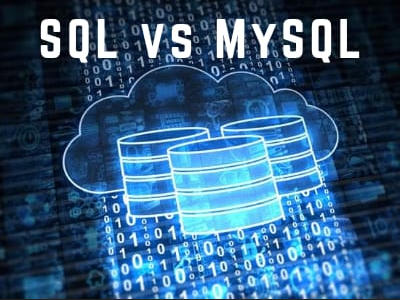- May 6, 2024
by Gauri Wahab - Sales & Marketing Officer
In this comprehensive overview, we delve into the foundational aspects and pivotal roles of SQL and MySQL databases Services across diverse applications and user scenarios. Exploring the standardized language of SQL for relational database management, we examine how MySQL emerges as a specific, feature-rich implementation of this language, offering extensive capabilities for robust database management. From software development to enterprise applications and beyond, SQL and MySQL databases serve as critical components, enabling efficient data storage, retrieval, and management while supporting a wide array of industries and technological domains.

Understanding the Fundamentals and Significance of Databases:
A database is a structured collection of data that is organized and stored in a computer. It is designed to efficiently manage and manipulate large volumes of data, making it accessible for various applications and users. A database system typically includes software, hardware, and data, and it allows users to interact with the data using specific languages and interfaces.
Key components and characteristics of a database include:
A database is a structured repository of data organized into tables, records (rows), and fields (columns), typically managed by a Database Management System (DBMS) like Oracle Database or MySQL. It ensures data integrity through constraints like primary keys and foreign keys, enabling operations such as data insertion, update, deletion, and querying using SQL (Structured Query Language). Databases also implement concurrency control to manage simultaneous data access and include security features like authentication, authorization, and encryption to safeguard against unauthorized access and manipulation.
Databases play a critical role in modern computing and information systems, serving as the backbone for applications in various domains, including e-commerce, finance, healthcare, telecommunications, and more. They enable efficient data storage, retrieval, and management, supporting business operations, decision-making, analytics, and reporting.
SQL (Structured Query Language):
SQL (Structured Query Language) is a standardized programming language used for managing and manipulating relational databases. It facilitates interactions with databases to perform tasks such as querying data, defining schema, and managing database objects like tables, views, indexes, and constraints.
Key features and concepts of SQL include:
SQL (Structured Query Language) encompasses essential features and commands for managing relational databases efficiently. It provides powerful capabilities for data retrieval through commands like `SELECT`, allowing users to extract specific data based on defined criteria.
SQL supports data manipulation operations such as `INSERT`, `UPDATE`, and `DELETE`, enabling the addition, modification, and removal of data within database tables. Additionally, SQL includes commands like `CREATE`, `ALTER`, and `DROP` for data definition, facilitating the creation, modification, and deletion of database schema, tables, and other objects.
SQL offers robust data control features through commands like `GRANT` and `REVOKE`, enabling administrators to manage access permissions and database security effectively. Furthermore, SQL enforces data integrity using constraints like `PRIMARY KEY`, `FOREIGN KEY`, `NOT NULL`, and `UNIQUE`, ensuring the accuracy, consistency, and reliability of data stored within the database.
Overall, SQL's comprehensive feature set and flexibility make it a fundamental language for interacting with relational databases, supporting critical data operations and ensuring data integrity.
MySQL:
MySQL is an open-source relational database management system (RDBMS) that implements the SQL language. It is developed, distributed, and supported by Oracle Corporation. MySQL is known for its reliability, performance, ease of use, and scalability, making it popular for web applications and small to medium-sized databases.
Key features of MySQL include:
MySQL offers a comprehensive set of features that make it a popular choice for database management. Its client/server architecture enables efficient communication between applications and the MySQL server, facilitating seamless database operations using SQL commands.
It supports a wide range of data types, allowing users to store diverse types of data such as integers, strings, dates, and times. One of MySQL's key strengths is its support for transactions and adherence to ACID (Atomicity, Consistency, Isolation, Durability) properties, ensuring data integrity and reliability. Additionally, MySQL provides robust user management and security capabilities, allowing administrators to define user accounts, assign privileges, and control access to databases.
For scalability and fault tolerance, MySQL supports replication, enabling the creation of redundant data copies to achieve high availability and resilience against failures. Overall, MySQL's rich feature set and reliability make it a preferred choice for various applications, from small-scale projects to large enterprise systems, seeking efficient and secure database management solutions.
Key Users and Common Scenarios for SQL and MySQL Databases:
SQL and MySQL databases are extensively employed across a diverse spectrum of users and applications owing to their flexibility, scalability, and resilience.
SQL and MySQL databases play crucial roles across various industries and sectors. Software developers utilize these databases extensively for web applications, including CMS platforms, e-commerce sites, and social media platforms, as well as mobile apps for storing user data and preferences.
Data analysts and scientists leverage SQL databases for data warehousing, running complex queries, and conducting analytics to drive business intelligence. They also use these databases for machine learning tasks, such as storing and preprocessing datasets for model training.
In the realm of business and enterprise applications, SQL databases are essential components of ERP systems, managing core business processes like inventory, procurement, and finance, while CRM applications rely on SQL databases for storing customer data and interactions.
Small to medium-sized businesses use SQL or MySQL databases for website development and internal data management, while educational institutions apply them for teaching database concepts and managing academic records.
Government agencies and non-profit organizations employ SQL databases for citizen data management, public services, and donor management. Additionally, system administrators and IT professionals use SQL databases for system monitoring, logging, and configuration management.
This widespread adoption underscores the versatility and importance of SQL and MySQL databases in modern technology ecosystems.
SQL and MySQL are related but distinct concepts in the realm of databases. Let's clarify their differences:
|
SQL |
MySQL |
|
- SQL is a standardized programming language used for managing and manipulating relational databases. |
- MySQL is an open-source relational database management system (RDBMS) that implements the SQL language. |
|
- It is not a specific database system but a language that defines how to interact with databases. |
- It is developed, distributed, and supported by Oracle Corporation.
|
|
- SQL is used to perform operations like querying data, inserting records, updating data, deleting records, creating tables, defining schema, and managing database objects. |
- MySQL is a specific database software product that uses SQL as its primary interface for managing and querying data.
|
|
- Examples of SQL commands include `SELECT`, `INSERT`, `UPDATE`, `DELETE`, `CREATE TABLE`, `ALTER TABLE`, `DROP TABLE`, and more. |
- It supports features such as transactions, indexing, stored procedures, triggers, views, and replication. |
|
- SQL is supported by most relational database management systems (RDBMS) like Oracle Database, Microsoft SQL Server, PostgreSQL, SQLite, and MySQL. |
- MySQL is widely used for web applications, content management systems, e-commerce platforms, and other data-driven applications. |
Key Differences:
|
Key Differences |
SQL |
MySQL |
|
SQL is a Language; MySQL is a Database System |
SQL is a standardized language used to interact with databases. |
MySQL is a specific database management system (DBMS) that implements SQL. |
|
Portability |
SQL queries are portable and can be used across different database systems. |
MySQL queries may have variations or specific features unique to MySQL. |
|
Vendor Specificity |
SQL is not tied to any specific vendor and is used across various database systems. |
MySQL is developed and supported by Oracle Corporation, with its specific features and optimizations. |
|
Features and Capabilities |
SQL provides standard operations and syntax consistent across databases. |
MySQL offers additional features like storage engines (e.g., InnoDB, MyISAM), replication, clustering, and user-defined functions beyond standard SQL. |
In summary, SQL and MySQL databases are suitable for a diverse range of users and applications, from software development and data analysis to business operations, education, and public services. Organizations of all sizes and across various industries can benefit from using SQL or MySQL databases to manage, store, and retrieve structured data efficiently and securely.
SQL is a standardized language for managing relational databases, while MySQL is a specific implementation of a relational database system that supports SQL.
MySQL extends the functionality of SQL with additional features and optimizations tailored to the MySQL database platform.
When comparing SQL vs. MySQL, it's important to recognize the distinction between the language (SQL) and the database system (MySQL) and understand how they complement each other in database management and development.
For more details connect with Data Patrol Technologies at info@datapatroltech.com or call us on


